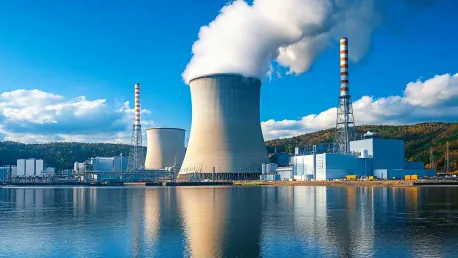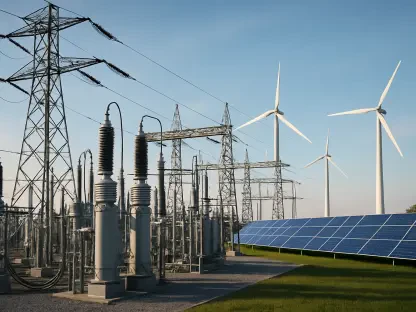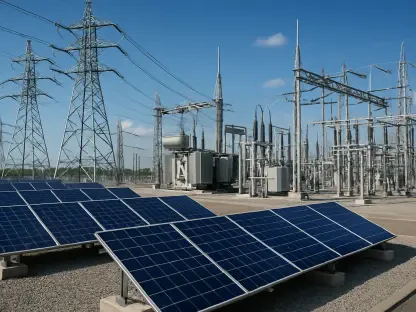The world of energy is on the brink of a significant evolution, thanks to a new agreement between Oklo, an advanced nuclear technology company, and Switch, a leading data center developer. This new partnership holds the potential to revolutionize energy solutions within the data center sector, with the possibility of deploying up to 12 GW of new reactor capacity over the next two decades. The nonbinding master power agreement provides a collaborative framework, with binding agreements expected as specific project milestones are achieved, signaling an ambitious yet methodical approach.
Initial Deployments and Future Scalability
50-MWe Aurora Reactors by 2029
The practical implementation of this agreement is set to begin with the deployment of Oklo’s 50-MWe Aurora powerhouse reactors, potentially as early as 2029. These initial reactors represent the starting point of a broader vision, with Oklo already exploring designs that offer more than 100 MW for future scalability. This kind of forward-thinking approach not only addresses immediate power needs but also paves the way for substantial growth and adaptation of nuclear technology to meet increasing energy demands.
This deal stands as one of the largest corporate power agreements in history, second only to a 10.5-GW agreement between Microsoft and Brookfield Asset Management, which focused primarily on wind, solar, and novel carbon-free energy technologies. The scale of the Oklo-Switch deal underscores a significant shift towards embracing nuclear energy for large-scale, sustained power needs, which is particularly pertinent for data centers that require a consistent and reliable energy source to support their operations.
Implications for the Renewable Energy Landscape
Switch has been utilizing 100% renewable energy for its data centers since 2016, showcasing its commitment to sustainability and environmental responsibility. By partnering with Oklo, known for its innovative nuclear solutions, Switch is taking a bold step that could not only accelerate the deployment of Oklo’s Aurora powerhouses but also significantly expand Oklo’s order book from 2.1 GW to approximately 14 GW. This massive jump in capacity reflects the growing demand for efficient and sustainable energy solutions within the tech industry.
This agreement signifies one of the first large-scale deployments of advanced nuclear reactors specifically tailored to meet the high energy needs of data centers. By integrating these reactors, Switch can ensure that it continues to provide reliable, renewable power to some of the world’s largest companies that rely on its facilities. This partnership also sets a precedent for other data center operators and technology firms to consider advanced nuclear options as viable and practical solutions for their energy requirements.
Oklo’s Unique Business Model
Development, Ownership, and Operation of Power Plants
Unlike many other advanced nuclear technology companies, Oklo has adopted a distinctive business model in which it not only develops but also owns and operates its power plants. This approach allows Oklo to sell electricity and heat directly to customers, offering a streamlined method of delivering energy that aligns with market demands. By maintaining control over the entire lifecycle of their reactors, Oklo can better manage operational efficiencies and ensure that their energy solutions remain cost-effective and reliable.
Oklo’s strategy has already drawn interest from several prominent entities, including Equinix and Prometheus Hyperscale, both key players in the data center industry. Additionally, Oklo has secured a similar nonbinding agreement with oil and gas producer Diamondback Energy, indicating the broad applicability of their nuclear technology across different sectors. Such diverse partnerships emphasize the versatility and growing acceptance of advanced nuclear solutions as a viable alternative to traditional energy sources.
Preparing for Deployment at Idaho National Laboratory
Currently, Oklo is preparing for early site work at the Idaho National Laboratory, with the deployment of its first 15-MW reactor anticipated by late 2027. The company plans to submit a combined license application in 2025, setting the stage for future scaling and further deployments based on the outcomes of these initial projects. The Idaho National Laboratory serves as a crucial testing ground for Oklo’s technologies, providing a critical platform for refining and optimizing their reactor designs before broad-scale implementation.
These efforts reflect a broader trend of increased collaboration between advanced nuclear companies and data center operators. Recent partnerships, such as those announced by Amazon and Google with nuclear firms X-energy and Kairos Power, further highlight this movement. Together, these collaborations represent a growing recognition within the tech industry of the benefits that nuclear energy can provide, such as reliable performance and minimal environmental impact when compared to traditional energy sources.
The Future of Renewable Energy and Data Centers
Impact on Industry Trends and Energy Solutions
This emerging partnership between Oklo and Switch underscores a broader industry trend toward innovative and sustainable energy solutions tailored to meet the specific needs of high-demand sectors like data centers. The ability of advanced nuclear technology to provide consistent, reliable power while reducing carbon footprints aligns perfectly with the sustainability goals of many leading technology companies. As data centers continue to expand and energy demands increase, such partnerships offer a glimpse into the future of energy solutions in the tech industry.
The impact of this agreement extends beyond just Switch and Oklo; it reflects a growing trend among major corporations to seek advanced, sustainable energy solutions. By investing in cutting-edge nuclear technology, companies not only demonstrate their commitment to environmental stewardship but also gain access to reliable power that can support their vast operational needs. This move towards embracing nuclear energy is likely to prompt further innovations and push the envelope for integrating renewable energy into high-demand industries.
Conclusion and Next Steps
The energy sector stands on the cusp of a substantial transformation due to a groundbreaking agreement between Oklo, an innovator in nuclear technology, and Switch, a prominent player in data center development. This collaboration is set to potentially overhaul energy solutions within the data center industry. Over the next two decades, the partnership aims to introduce up to 12 gigawatts of new reactor capacity, which could lead to unprecedented advancements in energy efficiency and sustainability.
The agreement, known as a nonbinding master power agreement, outlines a cooperative structure, paving the way for future binding contracts based on the achievement of specific project milestones. This methodical and ambitious strategy signifies a cautious, yet forward-thinking approach to integrating innovative nuclear power into the data center sector. If successful, this partnership could serve as a model for blending cutting-edge nuclear technology with high-demand data processing needs, ultimately fostering a more sustainable and efficient energy landscape for the future.









